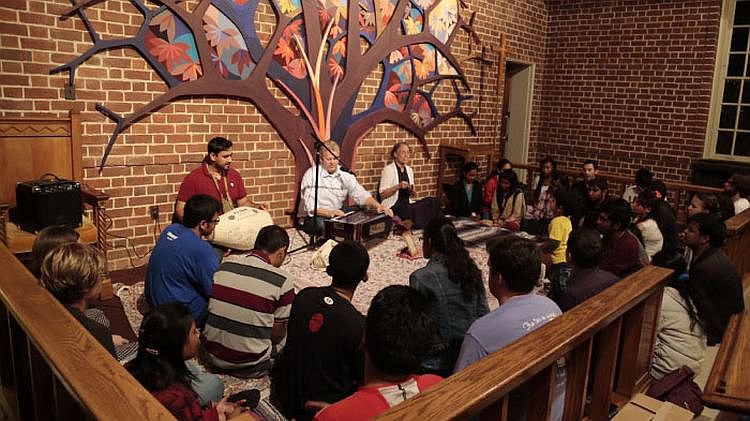
Cultural appropriation has been a hot topic lately, in society and in particularly on university campuses. At its heart the term refers to disrespectful, offensive and ignorant use of another culture’s sacred symbols and traditions.
For instance, Native American ceremonial clothing has been worn in frivolous settings. The images of Deities or religious figures have been placed on tennis shoes. Or to use a particularly upsetting historical example, the sacred Hindu Swastika was used by Hitler as a symbol of mass genocide and cruelty.
So it’s no wonder that there has been a fight against such cultural appropriation. But what happens when the fight is taken too far, with no distinction between different cases?
In 2011, the Bhakti Yoga and Vegetarian Club was started by ISKCON devotee Jahnavi Dasi at American University in Washington D.C. For the next seven years, the club ran every Tuesday from 6 – 7pm, drawing 25 – 30 students every week. Attendees chanted the Hare Krishna mantra on beads, heard from the Bhagavad-gita, asked questions and answers, and received a delicious pre-packed prasadam vegetarian dinner.
Every year, Madhuha Das was invited to set up his Festival of India event at American University, as well as at seven other universities in the Baltimore/Washington area. Many students thanked Jahnavi, grateful that they had become vegetarian after attending and reading books such as The Higher Taste. Others joined the club and became serious about Krishna consciousness.
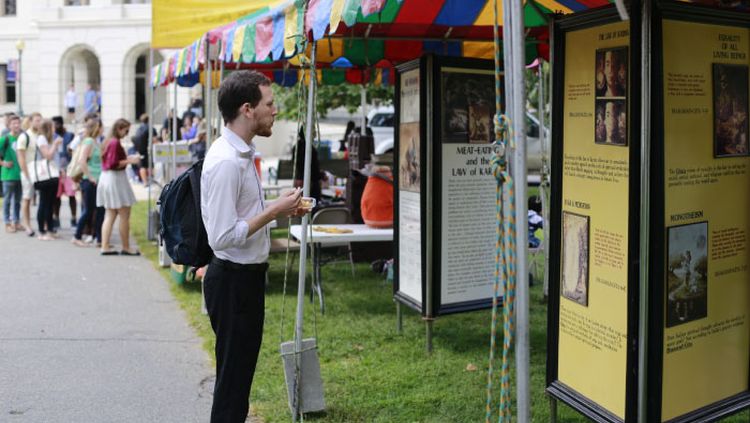
“We never ever had any controversy of any kind whatsoever,” Jahnavi says.
Then, on October 8th 2018, Indradyumna Swami’s popular troupe, Viva Kultura, performed the Indian epic The Ramayana at American University with a cast of artists from all over Africa, Europe and India. Many appreciated the unity in diversity, and were moved to see people from all over the world portray the sacred story together.
One South Asian student, however, by the name of Maya Krishnan, said she was offended to see white people and people from other races perform a play about an Indian story. Maya lodged a complaint with the President’s Council on Diversity and Inclusion at the University, and wrote an Op-Ed in the campus newspaper The Eagle, accusing the Bhakti Yoga Club of cultural appropriation.
The response was swift and shocking. Immediately, the club’s facultory advisor, vice president and president resigned, causing the club to lose its status and shutting down all its campus programs.
Jahnavi, who is of Indian descent herself, argues: “There is a very big difference between cultural appropriation and cultural appreciation. The performers of Viva Kultura are practicing Hindus. When someone converts to a religion, they are not cultural appropriators at all. There are many Indian Christians who have Christmas plays about baby Jesus. It wouldn’t offend American Christians to see an Indian Christian child respectfully perform the role of baby Jesus in a play.”
Regarding the Bhakti Yoga Club’s regular meetings, she adds: “There is nothing wrong if people of different races appreciate yoga and meditation. Just like there is nothing wrong if people of different races enjoy karate or tai chi.”
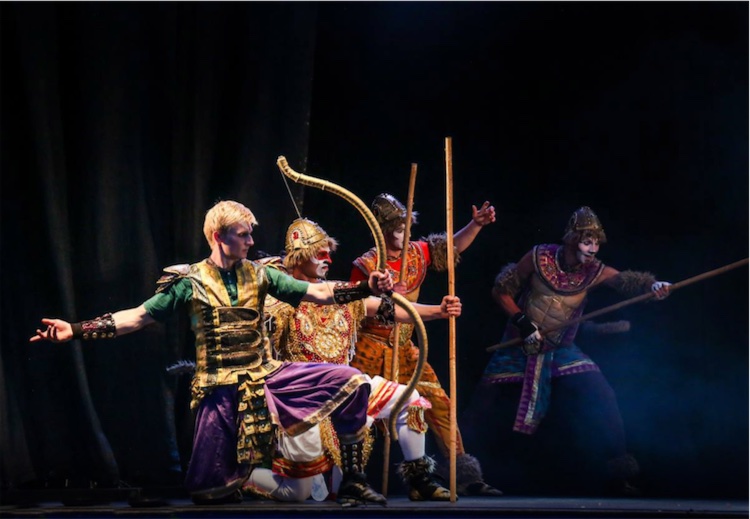
Ben Zavaleta, a student who has attended the club rain or shine for two years and passionately defends it, agrees. Ben has now been appointed president as he remains unafraid to stand up for the club. Others – aware of a climate extremely sensitive to issues like cultural appropriation – are fearful of repercussions.
“I joined out of sheer curiosity but ended up loving it,” Ben says. “I really love absorbing philosophy. And chanting one round [of the maha-mantra] on beads is as effective as taking my ADHD medication.”
Ben feels that the viewpoint on cultural appropriation that has shut the Bhakti Yoga Club down “Disregards any possible idea of cultural exchange, ignores any historical context for exchange of cultures, and is a very black and white view of things.”
He adds: “This is an affront to free exercise of religion on this campus, for anybody who meditates or has a spiritual practice,” and points out, “There were some Indian people in our group too. Maya has targeted other Indian students because she didn’t like a performance.”
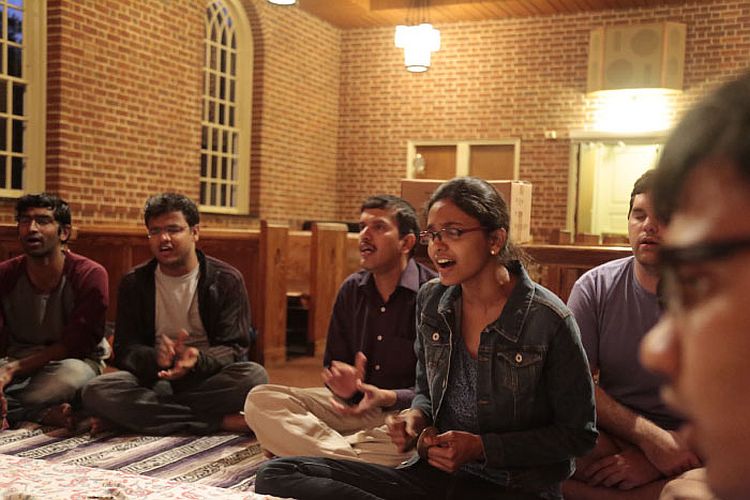
Interestingly, professors and chaplains from other universities – some of them South Asian themselves – are supporting the Bhakti Yoga Club. The University of Maryland hosted Viva Kultura the very next day after their American University performance, and UMD’s Hindu Chaplain, Rev. Kiran L. Sankhla, sent a letter of support to AU’s Council on Diversity and Inclusion.
“Over four hundred students attended the Oct. 9th Viva Kultura performance at the UMD Memorial Chapel,” she wrote. “The University of Maryland is a melting pot of cultures brought by students from across the world. Viva Kultura’s performance brought to our doorsteps the sound, smell, visuals and art of India by world-renowned troupe of artists. Before performing at American University and the University of Maryland College Park, Viva Kultura performed at the several universities in September of 2018. They performed at the University of Houston, Penn State, University of Michigan, Rutgers University, etc. The performers of Viva Kultura are from around the world, from different ethnicities and races. They are practicing Hindus.
“The students at the University of Maryland were full of smiles and thoroughly enjoyed Viva Kultura’s show. No student at the University of Maryland expressed that there was any cultural appropriation. Rather, Viva Kultura is doing cultural appreciation. I have been Hindu Chaplain at the University of Maryland since 1992. I am a double minority – a woman and a South Asian. I was impressed and touched that artists from many different countries were respectfully performing the ancient Indian Hindu story of the Ramayana. We look forward to inviting Viva Kultura to perform at the University of Maryland again next year.”
Edwin F. Bryant, Professor of Hinduism at Rutgers University, has also voiced his support.
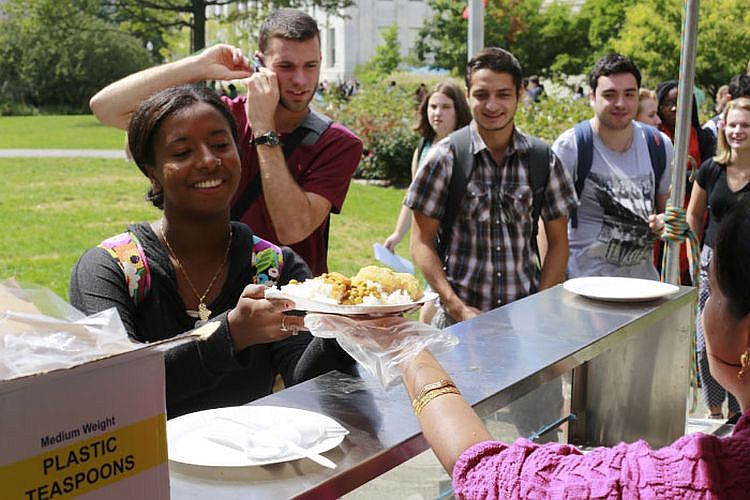
Ben and Jahnavi are currently trying to find a new faculty advisor for their club who is supportive and understands where they are coming from. Ben plans to speak further with the Council on Diversity and Inclusion which accepted Maya’s petition. He has also been invited to do an interview with The Eagle newspaper about his defense against Maya’s accusations.
According to Jahnavi, many students have been writing to her asking when the club will be meeting again. “Everyone misses the bhakti club,” she says.
It remains to be seen if the students of American University will get their club back. In the meantime, current views on cultural appropriation are clearly an important concern for ISKCON devotees.
ISKCON Communications Director Anuttama Das, who has been advising the AU’s Bhakti Yoga Club during this difficult time, recently spoke on a panel about cultural appropriation at The Parliament of the World’s Religions, and summed up the Vaishnava point of view well.
“The purpose of life is to enquire about the Absolute Truth,” he said. “And we should be open, and encourage people that any spiritual or religious practice, or cultural activity, that helps us achieve that awakening is good.”
He added: “If it helps people calm their minds and come closer to God, that’s exactly what we want. We don’t care who owns yoga – we care about who makes progress from yoga.”
“So I think we should in fact learn about and and use others’ cultural and spiritual practices,” he concludes. “But we should do so 1) in a respectful way 2) while understanding the boundaries that other people put around their traditions, and 3) we should give credit to where we have gotten the practice from.”
Source: https://iskconnews.org/bhakti-yoga-club-accused-of-cultural-appropriation-and-shut-down,6776/
Comments